University Essay: Role of Women in Democracy - A Historical Analysis
VerifiedAdded on 2021/04/17
|6
|1386
|27
Essay
AI Summary
This essay examines the evolving role of women in democracy, beginning with their limited participation in ancient Greece, where patriarchal structures and societal norms restricted their political involvement. The essay contrasts the experiences of women in Athens and Sparta, highlighting the varying degrees of freedom and influence they possessed. It then transitions to the modern era, analyzing the persistent underrepresentation of women in politics across various nations, and exploring the impact of cultural prejudices, civil liberties, and the historical context of gender equality movements. The essay discusses the significance of women's movements for equal rights, referencing examples from African and Middle Eastern countries. It concludes by emphasizing the crucial role of women in preserving the essence of democracy, advocating for their inclusion in political sectors, and the importance of ensuring broader representation and transparency in government. The essay highlights how democracy, while initially excluding women, has become a platform for them to demand equal participation and influence in shaping society.
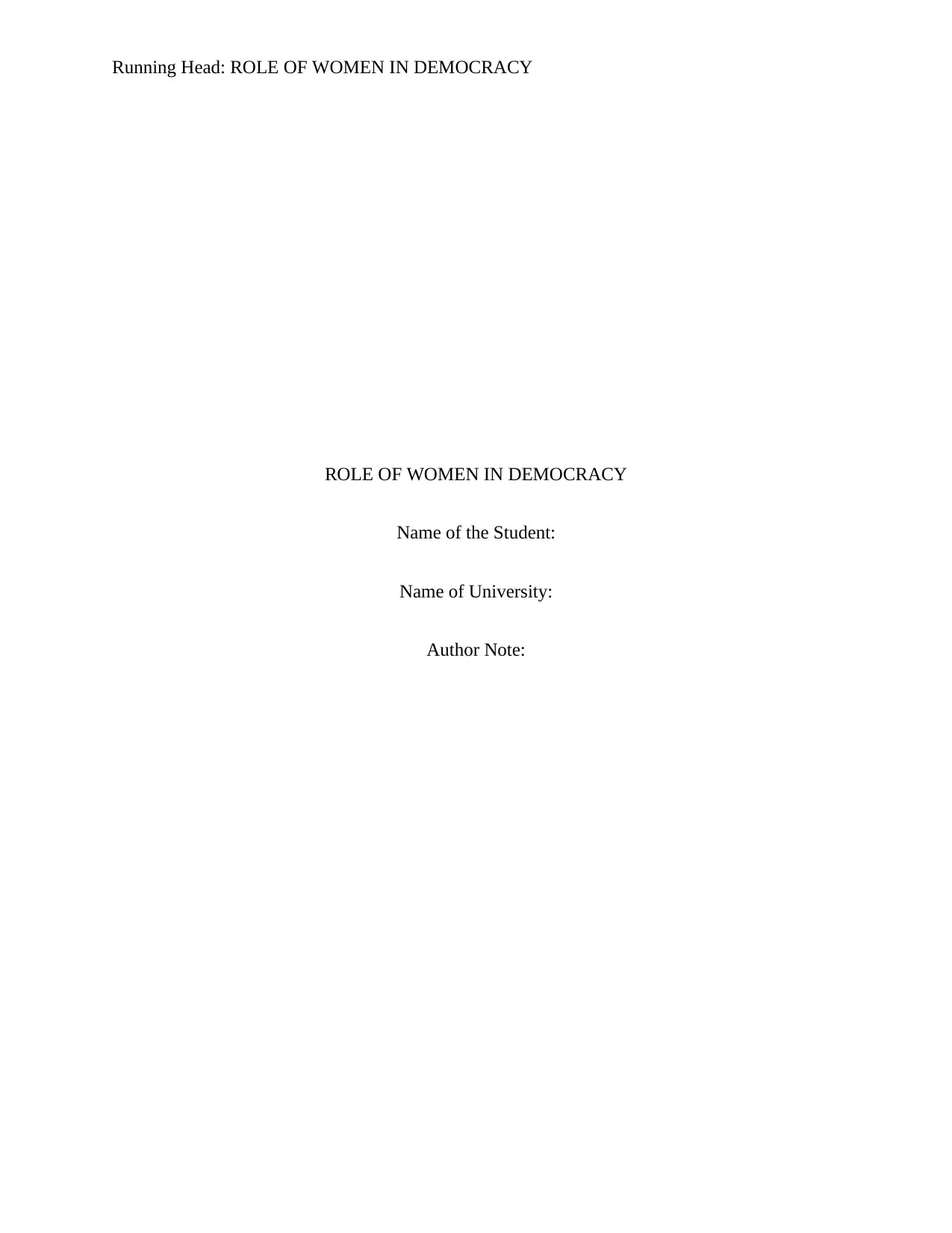
Running Head: ROLE OF WOMEN IN DEMOCRACY
ROLE OF WOMEN IN DEMOCRACY
Name of the Student:
Name of University:
Author Note:
ROLE OF WOMEN IN DEMOCRACY
Name of the Student:
Name of University:
Author Note:
Paraphrase This Document
Need a fresh take? Get an instant paraphrase of this document with our AI Paraphraser
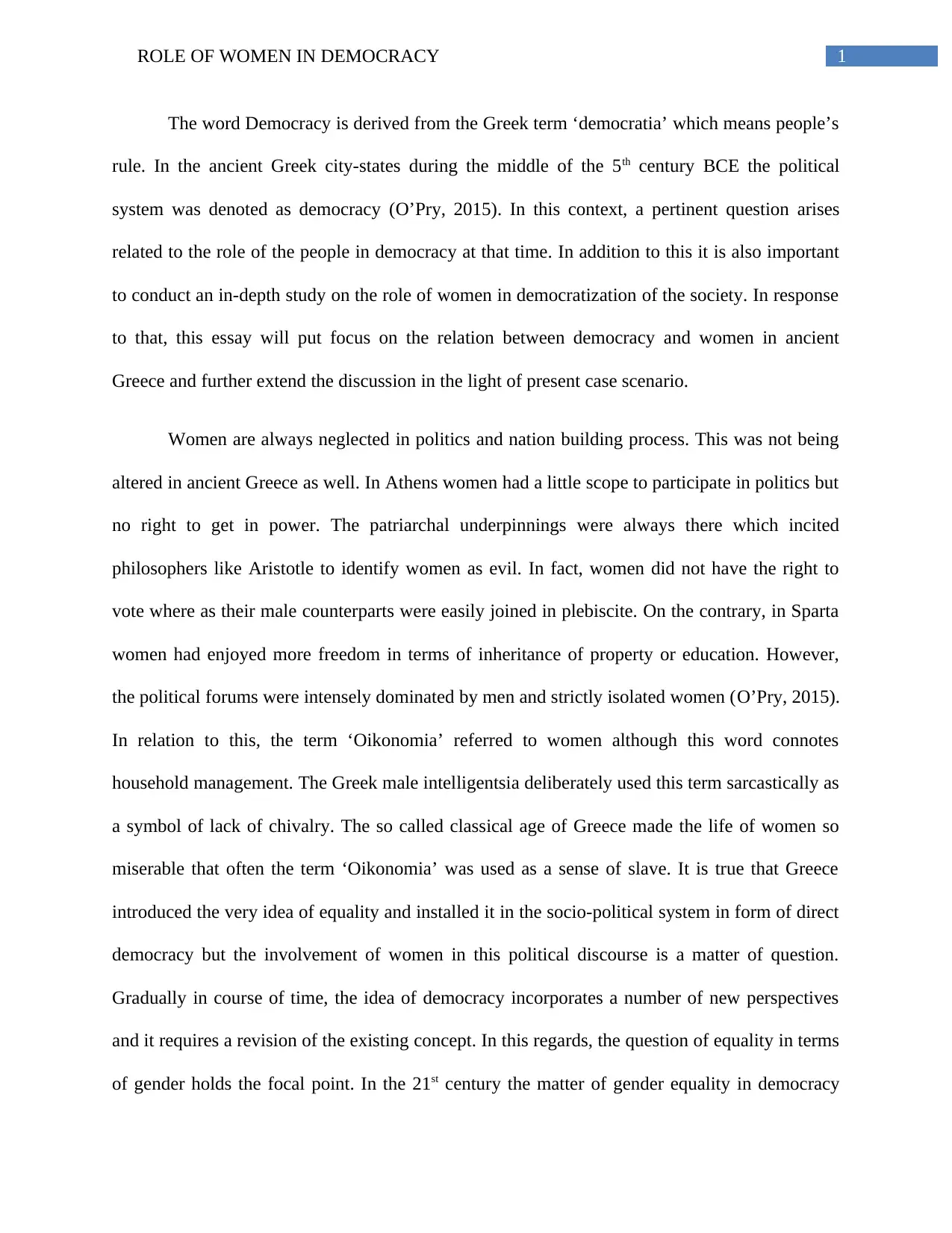
1ROLE OF WOMEN IN DEMOCRACY
The word Democracy is derived from the Greek term ‘democratia’ which means people’s
rule. In the ancient Greek city-states during the middle of the 5th century BCE the political
system was denoted as democracy (O’Pry, 2015). In this context, a pertinent question arises
related to the role of the people in democracy at that time. In addition to this it is also important
to conduct an in-depth study on the role of women in democratization of the society. In response
to that, this essay will put focus on the relation between democracy and women in ancient
Greece and further extend the discussion in the light of present case scenario.
Women are always neglected in politics and nation building process. This was not being
altered in ancient Greece as well. In Athens women had a little scope to participate in politics but
no right to get in power. The patriarchal underpinnings were always there which incited
philosophers like Aristotle to identify women as evil. In fact, women did not have the right to
vote where as their male counterparts were easily joined in plebiscite. On the contrary, in Sparta
women had enjoyed more freedom in terms of inheritance of property or education. However,
the political forums were intensely dominated by men and strictly isolated women (O’Pry, 2015).
In relation to this, the term ‘Oikonomia’ referred to women although this word connotes
household management. The Greek male intelligentsia deliberately used this term sarcastically as
a symbol of lack of chivalry. The so called classical age of Greece made the life of women so
miserable that often the term ‘Oikonomia’ was used as a sense of slave. It is true that Greece
introduced the very idea of equality and installed it in the socio-political system in form of direct
democracy but the involvement of women in this political discourse is a matter of question.
Gradually in course of time, the idea of democracy incorporates a number of new perspectives
and it requires a revision of the existing concept. In this regards, the question of equality in terms
of gender holds the focal point. In the 21st century the matter of gender equality in democracy
The word Democracy is derived from the Greek term ‘democratia’ which means people’s
rule. In the ancient Greek city-states during the middle of the 5th century BCE the political
system was denoted as democracy (O’Pry, 2015). In this context, a pertinent question arises
related to the role of the people in democracy at that time. In addition to this it is also important
to conduct an in-depth study on the role of women in democratization of the society. In response
to that, this essay will put focus on the relation between democracy and women in ancient
Greece and further extend the discussion in the light of present case scenario.
Women are always neglected in politics and nation building process. This was not being
altered in ancient Greece as well. In Athens women had a little scope to participate in politics but
no right to get in power. The patriarchal underpinnings were always there which incited
philosophers like Aristotle to identify women as evil. In fact, women did not have the right to
vote where as their male counterparts were easily joined in plebiscite. On the contrary, in Sparta
women had enjoyed more freedom in terms of inheritance of property or education. However,
the political forums were intensely dominated by men and strictly isolated women (O’Pry, 2015).
In relation to this, the term ‘Oikonomia’ referred to women although this word connotes
household management. The Greek male intelligentsia deliberately used this term sarcastically as
a symbol of lack of chivalry. The so called classical age of Greece made the life of women so
miserable that often the term ‘Oikonomia’ was used as a sense of slave. It is true that Greece
introduced the very idea of equality and installed it in the socio-political system in form of direct
democracy but the involvement of women in this political discourse is a matter of question.
Gradually in course of time, the idea of democracy incorporates a number of new perspectives
and it requires a revision of the existing concept. In this regards, the question of equality in terms
of gender holds the focal point. In the 21st century the matter of gender equality in democracy
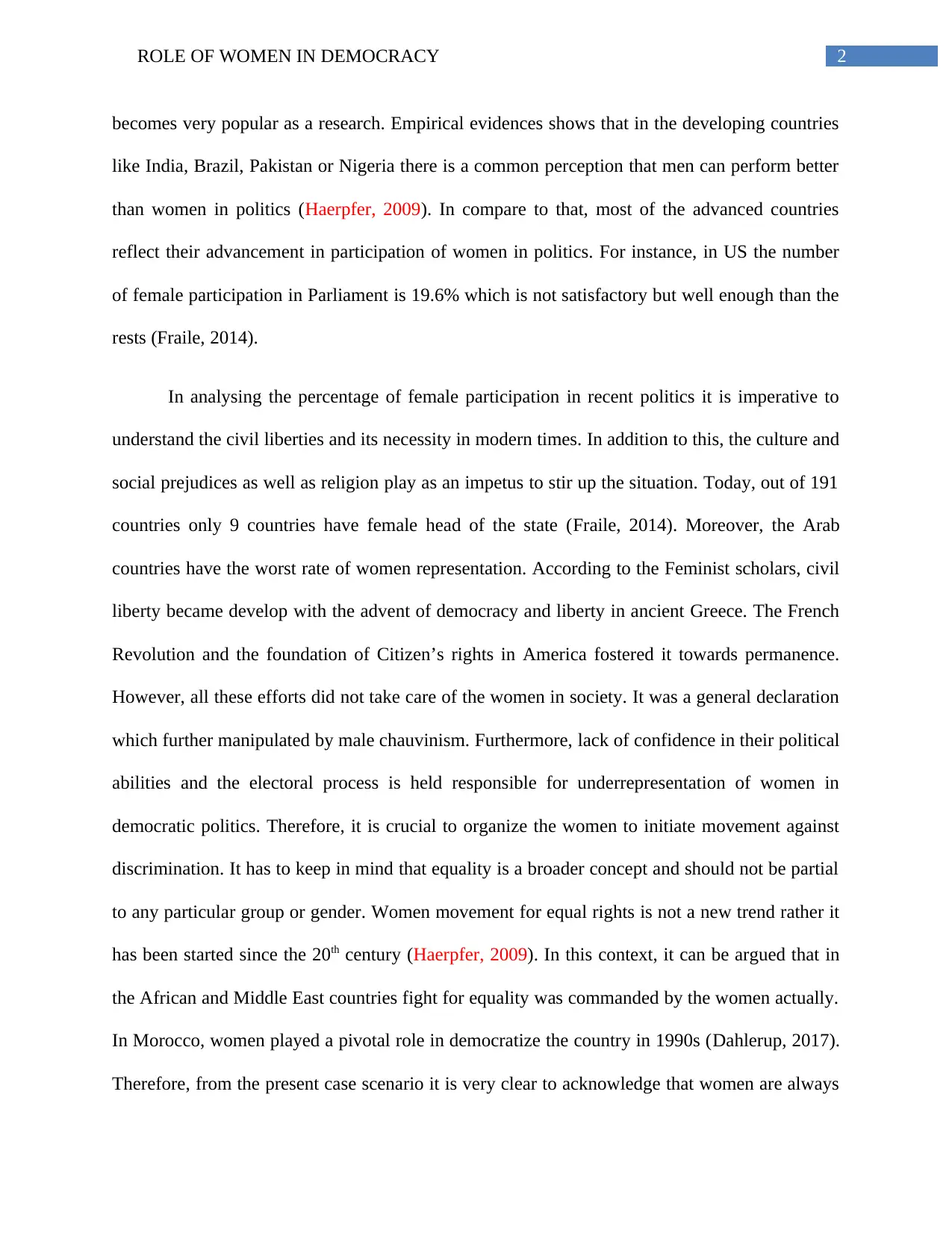
2ROLE OF WOMEN IN DEMOCRACY
becomes very popular as a research. Empirical evidences shows that in the developing countries
like India, Brazil, Pakistan or Nigeria there is a common perception that men can perform better
than women in politics (Haerpfer, 2009). In compare to that, most of the advanced countries
reflect their advancement in participation of women in politics. For instance, in US the number
of female participation in Parliament is 19.6% which is not satisfactory but well enough than the
rests (Fraile, 2014).
In analysing the percentage of female participation in recent politics it is imperative to
understand the civil liberties and its necessity in modern times. In addition to this, the culture and
social prejudices as well as religion play as an impetus to stir up the situation. Today, out of 191
countries only 9 countries have female head of the state (Fraile, 2014). Moreover, the Arab
countries have the worst rate of women representation. According to the Feminist scholars, civil
liberty became develop with the advent of democracy and liberty in ancient Greece. The French
Revolution and the foundation of Citizen’s rights in America fostered it towards permanence.
However, all these efforts did not take care of the women in society. It was a general declaration
which further manipulated by male chauvinism. Furthermore, lack of confidence in their political
abilities and the electoral process is held responsible for underrepresentation of women in
democratic politics. Therefore, it is crucial to organize the women to initiate movement against
discrimination. It has to keep in mind that equality is a broader concept and should not be partial
to any particular group or gender. Women movement for equal rights is not a new trend rather it
has been started since the 20th century (Haerpfer, 2009). In this context, it can be argued that in
the African and Middle East countries fight for equality was commanded by the women actually.
In Morocco, women played a pivotal role in democratize the country in 1990s (Dahlerup, 2017).
Therefore, from the present case scenario it is very clear to acknowledge that women are always
becomes very popular as a research. Empirical evidences shows that in the developing countries
like India, Brazil, Pakistan or Nigeria there is a common perception that men can perform better
than women in politics (Haerpfer, 2009). In compare to that, most of the advanced countries
reflect their advancement in participation of women in politics. For instance, in US the number
of female participation in Parliament is 19.6% which is not satisfactory but well enough than the
rests (Fraile, 2014).
In analysing the percentage of female participation in recent politics it is imperative to
understand the civil liberties and its necessity in modern times. In addition to this, the culture and
social prejudices as well as religion play as an impetus to stir up the situation. Today, out of 191
countries only 9 countries have female head of the state (Fraile, 2014). Moreover, the Arab
countries have the worst rate of women representation. According to the Feminist scholars, civil
liberty became develop with the advent of democracy and liberty in ancient Greece. The French
Revolution and the foundation of Citizen’s rights in America fostered it towards permanence.
However, all these efforts did not take care of the women in society. It was a general declaration
which further manipulated by male chauvinism. Furthermore, lack of confidence in their political
abilities and the electoral process is held responsible for underrepresentation of women in
democratic politics. Therefore, it is crucial to organize the women to initiate movement against
discrimination. It has to keep in mind that equality is a broader concept and should not be partial
to any particular group or gender. Women movement for equal rights is not a new trend rather it
has been started since the 20th century (Haerpfer, 2009). In this context, it can be argued that in
the African and Middle East countries fight for equality was commanded by the women actually.
In Morocco, women played a pivotal role in democratize the country in 1990s (Dahlerup, 2017).
Therefore, from the present case scenario it is very clear to acknowledge that women are always
⊘ This is a preview!⊘
Do you want full access?
Subscribe today to unlock all pages.

Trusted by 1+ million students worldwide
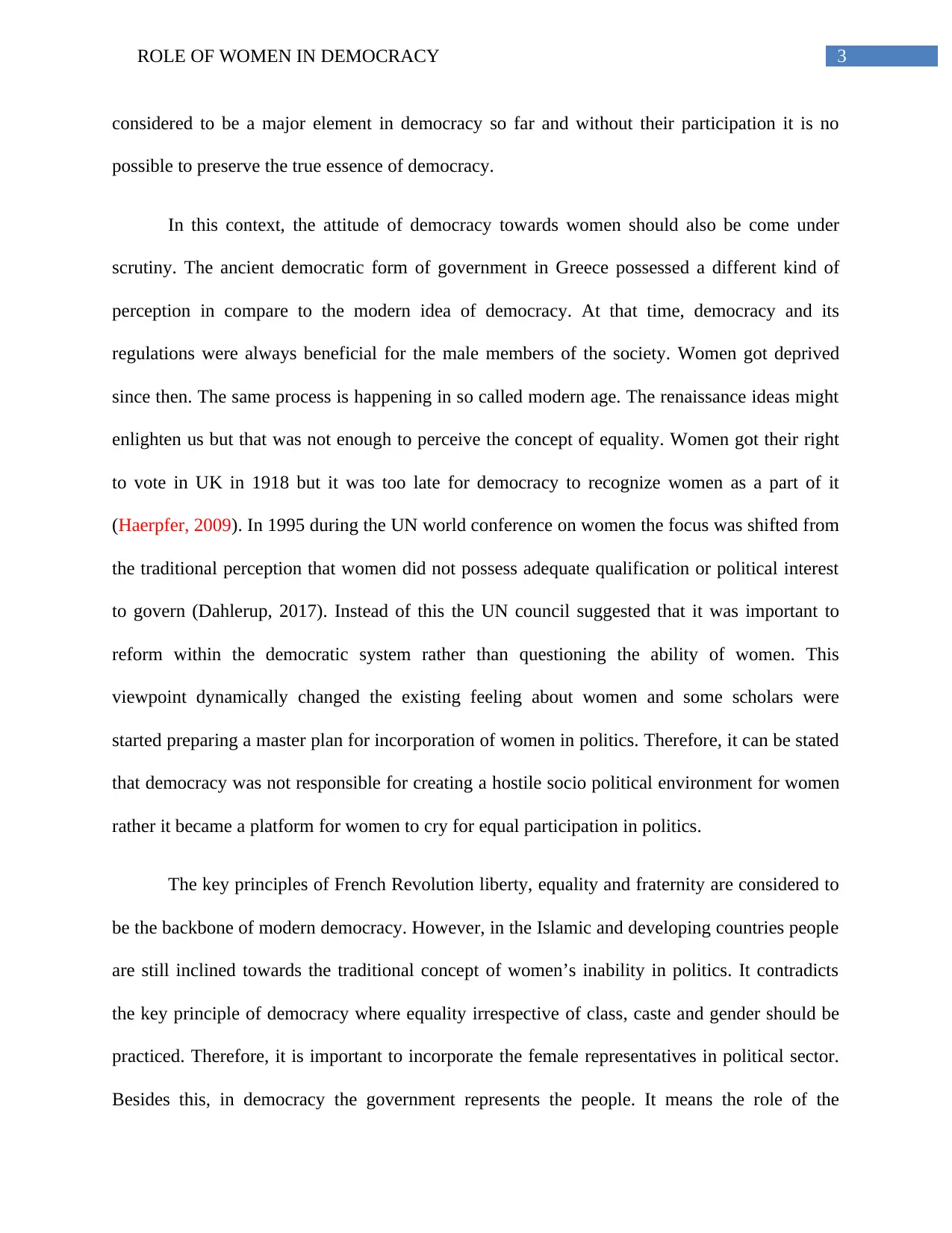
3ROLE OF WOMEN IN DEMOCRACY
considered to be a major element in democracy so far and without their participation it is no
possible to preserve the true essence of democracy.
In this context, the attitude of democracy towards women should also be come under
scrutiny. The ancient democratic form of government in Greece possessed a different kind of
perception in compare to the modern idea of democracy. At that time, democracy and its
regulations were always beneficial for the male members of the society. Women got deprived
since then. The same process is happening in so called modern age. The renaissance ideas might
enlighten us but that was not enough to perceive the concept of equality. Women got their right
to vote in UK in 1918 but it was too late for democracy to recognize women as a part of it
(Haerpfer, 2009). In 1995 during the UN world conference on women the focus was shifted from
the traditional perception that women did not possess adequate qualification or political interest
to govern (Dahlerup, 2017). Instead of this the UN council suggested that it was important to
reform within the democratic system rather than questioning the ability of women. This
viewpoint dynamically changed the existing feeling about women and some scholars were
started preparing a master plan for incorporation of women in politics. Therefore, it can be stated
that democracy was not responsible for creating a hostile socio political environment for women
rather it became a platform for women to cry for equal participation in politics.
The key principles of French Revolution liberty, equality and fraternity are considered to
be the backbone of modern democracy. However, in the Islamic and developing countries people
are still inclined towards the traditional concept of women’s inability in politics. It contradicts
the key principle of democracy where equality irrespective of class, caste and gender should be
practiced. Therefore, it is important to incorporate the female representatives in political sector.
Besides this, in democracy the government represents the people. It means the role of the
considered to be a major element in democracy so far and without their participation it is no
possible to preserve the true essence of democracy.
In this context, the attitude of democracy towards women should also be come under
scrutiny. The ancient democratic form of government in Greece possessed a different kind of
perception in compare to the modern idea of democracy. At that time, democracy and its
regulations were always beneficial for the male members of the society. Women got deprived
since then. The same process is happening in so called modern age. The renaissance ideas might
enlighten us but that was not enough to perceive the concept of equality. Women got their right
to vote in UK in 1918 but it was too late for democracy to recognize women as a part of it
(Haerpfer, 2009). In 1995 during the UN world conference on women the focus was shifted from
the traditional perception that women did not possess adequate qualification or political interest
to govern (Dahlerup, 2017). Instead of this the UN council suggested that it was important to
reform within the democratic system rather than questioning the ability of women. This
viewpoint dynamically changed the existing feeling about women and some scholars were
started preparing a master plan for incorporation of women in politics. Therefore, it can be stated
that democracy was not responsible for creating a hostile socio political environment for women
rather it became a platform for women to cry for equal participation in politics.
The key principles of French Revolution liberty, equality and fraternity are considered to
be the backbone of modern democracy. However, in the Islamic and developing countries people
are still inclined towards the traditional concept of women’s inability in politics. It contradicts
the key principle of democracy where equality irrespective of class, caste and gender should be
practiced. Therefore, it is important to incorporate the female representatives in political sector.
Besides this, in democracy the government represents the people. It means the role of the
Paraphrase This Document
Need a fresh take? Get an instant paraphrase of this document with our AI Paraphraser
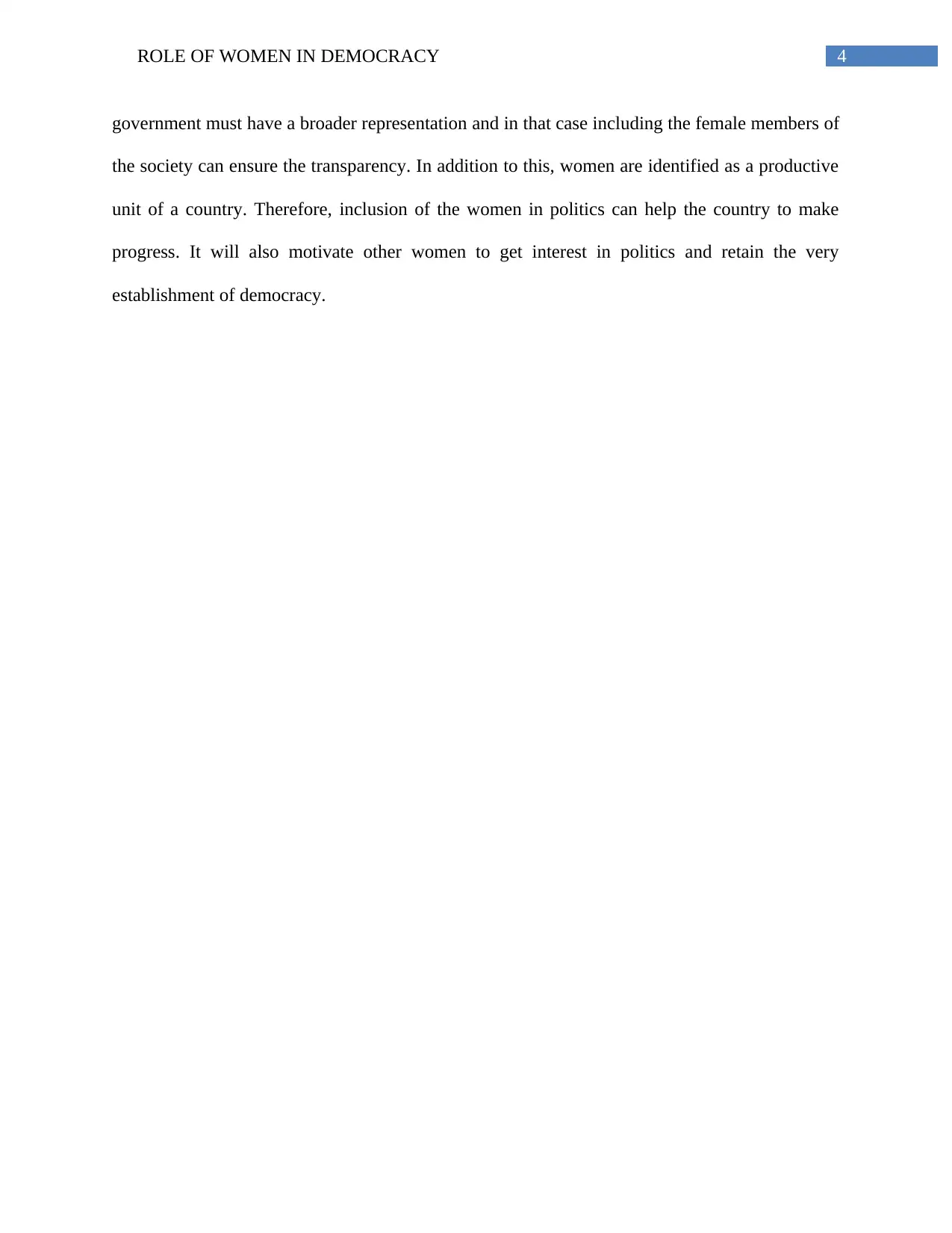
4ROLE OF WOMEN IN DEMOCRACY
government must have a broader representation and in that case including the female members of
the society can ensure the transparency. In addition to this, women are identified as a productive
unit of a country. Therefore, inclusion of the women in politics can help the country to make
progress. It will also motivate other women to get interest in politics and retain the very
establishment of democracy.
government must have a broader representation and in that case including the female members of
the society can ensure the transparency. In addition to this, women are identified as a productive
unit of a country. Therefore, inclusion of the women in politics can help the country to make
progress. It will also motivate other women to get interest in politics and retain the very
establishment of democracy.
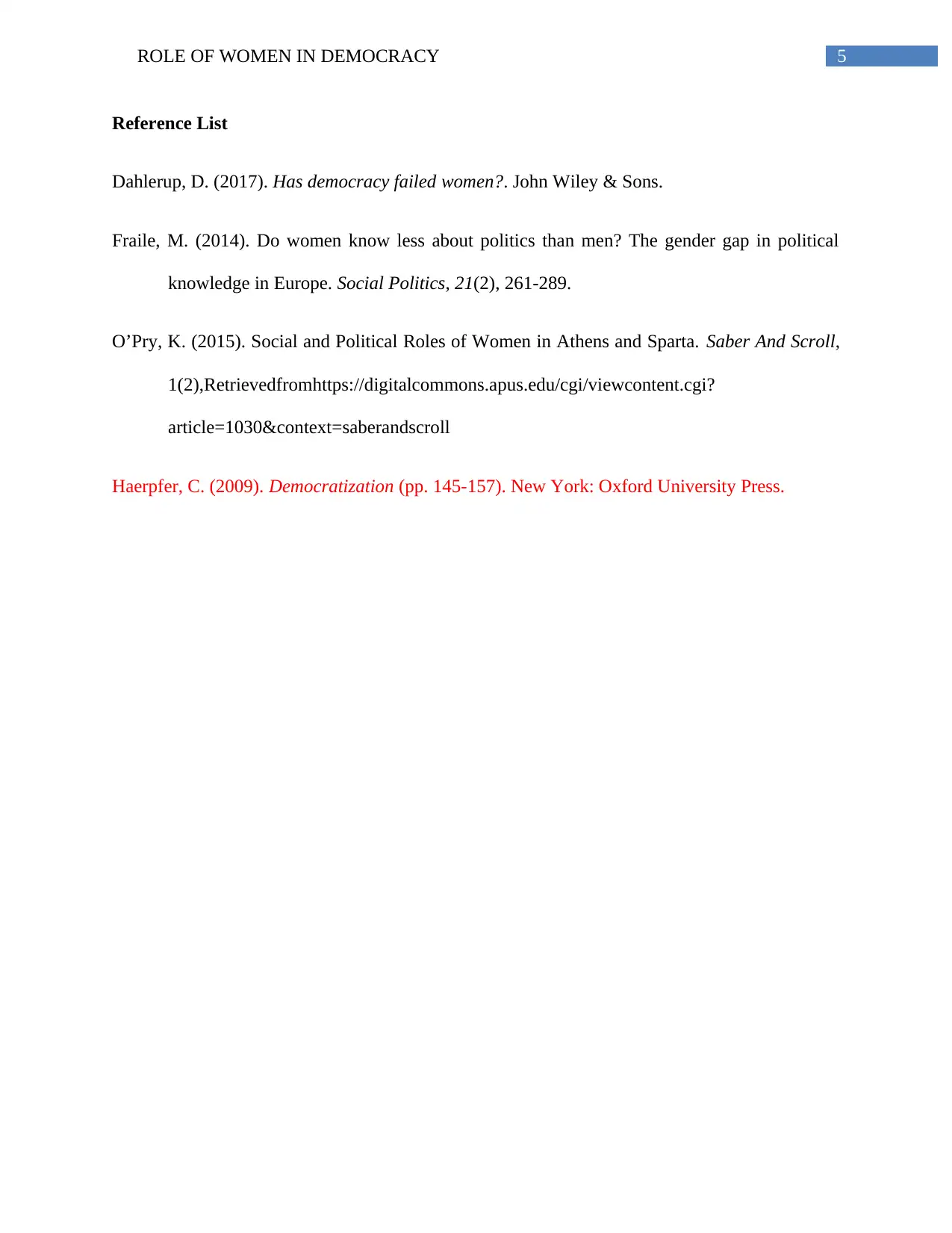
5ROLE OF WOMEN IN DEMOCRACY
Reference List
Dahlerup, D. (2017). Has democracy failed women?. John Wiley & Sons.
Fraile, M. (2014). Do women know less about politics than men? The gender gap in political
knowledge in Europe. Social Politics, 21(2), 261-289.
O’Pry, K. (2015). Social and Political Roles of Women in Athens and Sparta. Saber And Scroll,
1(2),Retrievedfromhttps://digitalcommons.apus.edu/cgi/viewcontent.cgi?
article=1030&context=saberandscroll
Haerpfer, C. (2009). Democratization (pp. 145-157). New York: Oxford University Press.
Reference List
Dahlerup, D. (2017). Has democracy failed women?. John Wiley & Sons.
Fraile, M. (2014). Do women know less about politics than men? The gender gap in political
knowledge in Europe. Social Politics, 21(2), 261-289.
O’Pry, K. (2015). Social and Political Roles of Women in Athens and Sparta. Saber And Scroll,
1(2),Retrievedfromhttps://digitalcommons.apus.edu/cgi/viewcontent.cgi?
article=1030&context=saberandscroll
Haerpfer, C. (2009). Democratization (pp. 145-157). New York: Oxford University Press.
⊘ This is a preview!⊘
Do you want full access?
Subscribe today to unlock all pages.

Trusted by 1+ million students worldwide
1 out of 6
Related Documents
Your All-in-One AI-Powered Toolkit for Academic Success.
+13062052269
info@desklib.com
Available 24*7 on WhatsApp / Email
![[object Object]](/_next/static/media/star-bottom.7253800d.svg)
Unlock your academic potential
Copyright © 2020–2026 A2Z Services. All Rights Reserved. Developed and managed by ZUCOL.





